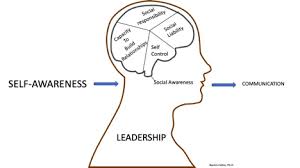
Effective leadership across industries consists of several characteristics, competencies, and skills. This leadership includes gaining the deep respect of team members and consistently delivering measurable business results. The one trait that proves universal in leaders of all kinds is self-awareness.
What is Self-Awareness?
Merriam-Webster defines self-awareness as, “An awareness of one’s own personality or individuality.” However, developing this attribute is harder than it seems from that definition.
A shift in mindset can develop self-awareness. It takes time and reflection, a conscious effort, and an investment in understanding who we are and who others are. The rules that we apply in our everyday lives (our mindset) manifest our behaviors. When we are willing to look at our underlying beliefs, bias, and assumptions, a mind-shift can happen. Then we can find a pathway to change our behaviors.
Developing self-awareness as a leader will strengthen not only individual performance, but organizational performance. Ultimately, the immense amount of understanding, trustworthiness, and wisdom that self-aware leaders possess equips them with critical success skills. It helps them develop greater authenticity and integrity in the process.
Characteristics of Self-Aware Leaders
A self-aware leader will have a greater understanding of themselves and the impact they have on others. They will accept feedback, admit and be willing to learn from their mistakes, and take the time necessary to understand their employees’ motivations. This leader is direct in their approach, clear in their communication, and skillful in setting expectations for those they lead. When stressful situations arise, and they will, you will find them to be more composed. Their performance will be more consistent and up for the challenges they face. People want to follow and work for this leader and will go the extra mile to achieve results.
Characteristics of Leaders that Lack Self-Awareness
A leader who lacks self-awareness is typically unaware of why they do many of the things that they do and unaware of the impact they are having on others. They can blame their circumstances and/or others for many of their problems. This lack of self-awareness can significantly diminish how genuine and authentic they come across. This leader can be indirect in their approach, unclear in their communication, and in setting expectations for those they lead. Followers will be less motivated and engaged by them. When stressful situations arise, you can often witness this leader’s lack of composure. The impact on their performance and the performance of others is often undesirable and significant.
Conclusion
During these challenging times, leadership and followership are a must. A leader who is more self-aware is better positioned to live and work in our VUCA-volatile, uncertain, complex, and ambiguous world. Leaders with a mindset that is self-aware can build stronger more adaptable teams and achieve greater results.
How self-aware are you? Is it time to shift your mindset?
Learn more about how you can shift your mindset and improve your self-awareness as a leader. Let’s start a conversation! Schedule a free consultation at asulmonte.com.


